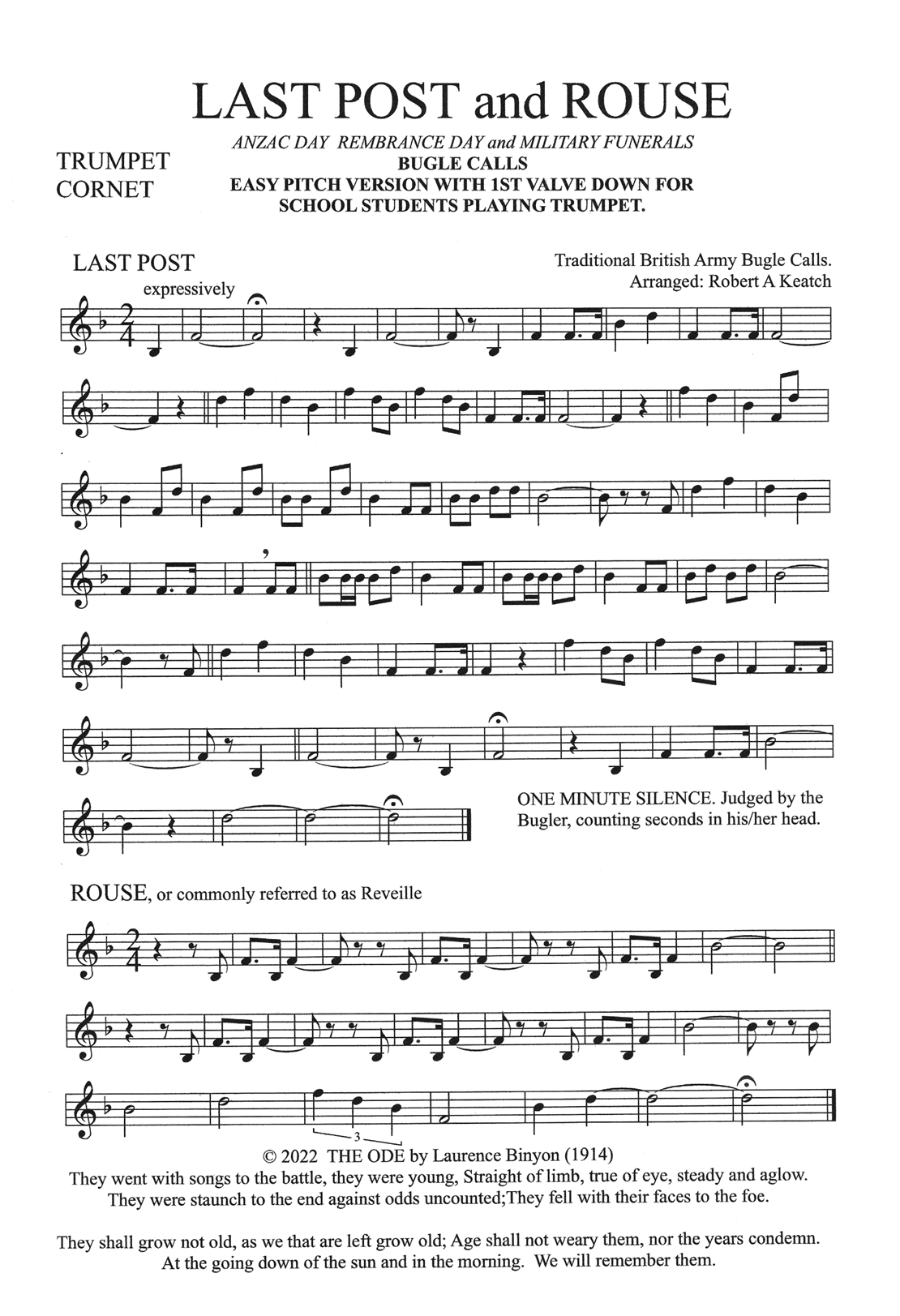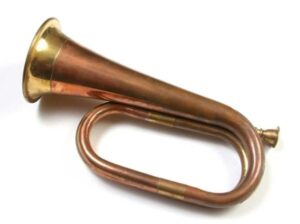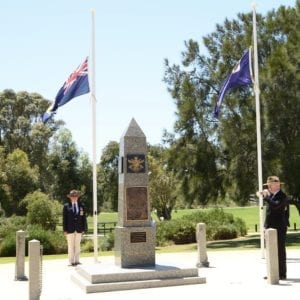

Our Member and North Beach RSL Sub-Branch Buglar, Robert Keatch, has generously arranged and provided the music for The Last Post and Rouse.
To print a copy of this see This Link

Since Roman times, bugles or horns have been used as signals to command soldiers on the battlefield and to regulate a soldiers’ days in barracks.
The custom of waking soldiers to a bugle call, dates to the Roman Legions when the rank and file were raised by horns playing Diana’s Hymn. To this day the French term for Reveille is ‘La Diana’.
When bugle calls were officially introduced into the British System by King George III, a special call was written for the waking of troops. This was known as Reveille meaning ‘to wake again’, from the old French. Joseph Hayden is generally regarded as the composer of the calls which exist substantially unchanged today.
Bugle calls were used for hundreds of years in the British Army with this tradition flowing over into the Australian Army to this very day. Calls were sounded so that soldiers keep track of time when living in military camps. There was a variety of sounds and notes each of these having a specific meaning. The signal meanings ranged from the time to wake, mealtimes, time to partake in military exercises, or time to go to bed for the night. Every day in camp was regulated and run according to the calls of the Army’s bugler.
Reveille
The purpose of Reveille in commonwealth military tradition is to wake up the sleeping soldiers. Sentries would be strategically placed in depositions during the night to warn the main force of enemy infiltration. The sounding of Reveille would signal the duty officers had completed their inspection of the perimeter and sentries would be able to stand down.
The word Reveille is derived from the French word ‘reveillez’, meaning to ‘wake-up’. The British origins of these bugle call meant, the soldiers’ days began with buglers playing Reveille and ended with the sounds of the Last Post.
Words to Reveille:
Rev-eil-lee!
Rev-eil-lee is sounding
The bugle calls you from your sleep; it is the break of day.
You’ve got to do your duty or you will get no pay.
Rouse
The Rouse is a bugle call played at memorial services in conjunction with the Last Post. The Rouse being sounded is used to call soldiers to their duties. In Australian military tradition, Reveille is only to be used at Anzac Day services or the waking of the troops (beginning of the day). The Rouse is to be used at commemorative services such as Remembrance Day, dedication or memorial services or at military funerals.
Words to Rouse
Get up at once, get up at once, the bugle’s sounding,
The day is here and never fear, old Sol is shining.
The Orderly Officer’s on his rounds.
The bugle call played after the ‘silence’ during any ceremony is:
Reveille
ANZAC Day Dawn Service
Rouse
ANZAC Day services, as well as Remembrance Day services and at other time of the day.
The Last Post
In military tradition, the Last Post is the bugle call that signifies the end of the day’s activities. It is also sounded at military funerals to indicate that the soldier has gone to his final rest and at commemorative services such as Anzac Day and Remembrance Day.
The Last Post is one of a number of bugle calls in military tradition that mark the phases of the day. While Reveille signals the start of a soldier’s day, the Last Post signals its end.
The call is believed to have originally been part of a more elaborate routine, known in the British Army as “tattoo”, that began in the 17th century. In the evening, a duty officer had to do the rounds of his unit’s position, checking that the sentry posts were manned and rounding up the off-duty soldiers and packing them off to their beds or billets. The officer would be accompanied by one or more musicians. The “first post” was sounded when he started his rounds and, as the party went from post to post, a drum was played. The drum beats told off-duty soldiers it was time to rest; if the soldiers were in a town, the beats told them it was time to leave the pubs. (The word “tattoo” comes from the Dutch Doe den tap toe, meaning “Close the tap”. of beer kegs; Americans call this “taps” or “drum taps”). Another bugle call was sounded when the officer’s party completed its rounds, reaching the “last post” – this signalled that the night sentries were alert at their posts and gave one last warning to the other soldiers.
The Last Post was eventually incorporated into funeral and memorial services as a final farewell and symbolises the duty of the dead is over, and they can rest in peace.
After the one minute’s silence, flags are raised from half-mast to the masthead as the Rouse is sounded. Today it is associated with the Last Post at all military funerals, and at services of dedication and remembrance.

